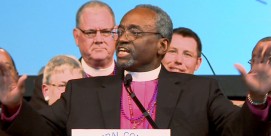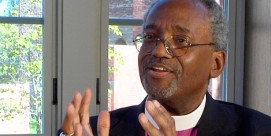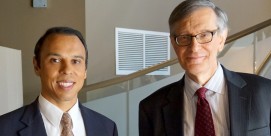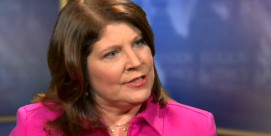In This Episode << SLIDE LEFT TO SEE ADDITIONAL SEGMENTS
Reverend Ed Bacon
Read more of Kim Lawton’s interview with the Rev. Ed Bacon, rector of All Saints Episcopal Church in Pasadena, California:
Q: Tell us why your church decided to go ahead and officiate at same sex weddings in California.
A: I think that the central reason is that we believe that God’s love is not discriminatory. It’s not bigoted. There are no second-class citizens, and so the graces of the church should extend to everyone, regardless of who they are.
Q: This has been controversial within the Episcopal Church, and the dioceses in California aren’t all agreeing. Why is there still so much controversy about this?

Rev. Ed Bacon |
A: Even within the Episcopal Church there is a lack of exposure to healthy relationships with gay and lesbian Christians, because people have not felt welcome in a church that discriminated against them and a church that they felt was abusive. One of our important lay leaders here who happens to be heterosexual says that where you stand on this issue depends on where you sit on Sunday morning, and by that he means whether or not you are worshipping with brothers and sisters in Christ who are gay and lesbian, who have been on your board with you, or the vestry, who have been in Bible study groups, who have been in prayer groups, and we’ve had the great benefit of that here at All Saints Church. And our children here have grown up understanding that that is the norm, so when our vestry had a called meeting after the California Supreme Court decision, one of our leaders said this is a slam dunk decision, this is a no brainer. Of course we’re not going to be bigoted. Of course we’re not going to be discriminatory. Let’s move forward now.
Q: I’ve talked to some clergy who are really wrestling with whether or not to perform same-sex marriages in their churches. What would you say to those who are struggling over whether this is the right thing to do?
A: I would tell them that Jesus said seek first the kingdom of God and its justice, or its righteousness — both of those words come from the same Greek word — and all these things shall be added to you. The first thing we seek is the kingdom of God and its justice. If we always take a stand for justice everything else works out, so I would encourage them to step outside their comfort zone and experience the joy that we have experienced here at All Saints.
Q: One thing you hear over and over again from different segments of the Christian community is God instituted marriage between a man and a woman, and the Bible says this is between a man and a woman. How do you respond to that?
A: I think it’s very clear that the Bible has an arc that moves towards inclusiveness. Peter himself had a conversion experience about his fixed certainties and the things he felt repugnant toward, and the entire New Testament is about inclusion, about bringing more and more people in and understanding that there’s nothing God created which is inherently evil, and so the Bible itself moves towards inclusion.
Q: Let’s put this issue and what’s happening here in the bigger context of the struggles going on within the US Episcopal Church, and even more broadly within the worldwide Anglican Communion. Have you thought about the impact what you are doing here may have on those wider decisions? Is there a worry or a thought at all that this might in some way exacerbate the tensions?
A: Rather than being worried about the impact of what we’re doing, I’m very excited about the impact of what we’re doing, because I’ve been in the church and have been a priest long enough to have seen the inclusion of women in ordination to the priesthood, and it took some pioneering leaders of the church to step out and say God is for all, and the church had to grapple with the reality of women who were ordained priests. The church will have to grapple with gay and lesbian members who are married, and it will cause some bit of chaos and some bit of rocking the boat, disequilibrium for a while, but the church is led by the Holy Spirit, and I have great excitement and great joy and great confidence that the Holy Spirit will lead us into all truth, which will be about embracing all people.
Q: Bishops from around the world will be gathering for the Lambeth Conference. Is there a sense that while the leaders are gathering and there are going to be conversations, Lambeth is all about conversation? Do you feel like, at the church level, you all are saying, “We’re moving forward while you all are talking”?
A: Absolutely. The church is moving forward. The church in its pastoral responsibilities to the people of the pew must be engaging, consoling, comforting, empowering rather than abusing its members. So we have a responsibility here on the ground, at the grassroots level, to move forward with justice, inclusion, love, and compassion, and the bishops can talk about it, but we think the bishops will come around and see that we are exercising great pastoral responsibility.
Q: For those who say this is a violation of Scripture and what they think Anglican tradition and historic Christianity teach, where does this leave them?
A: My experience, again, is quite lengthy, and I’ve seen people leave the church over the ordination of women and the change in the prayer book, and then I’ve seen those people come back after they grapple with issues of inclusion and justice. So I have every confidence that those who might leave would be leaving temporarily and then come back. I had a marvelous experience in my former post where I was called by a congregation in the city who had left the cathedral prior to my being the dean there, asking to come back, saying that they knew that the trajectory they were on was a dead end street, and it ended in anger and splinteredness, and they wanted to come back in. I have every confidence that’s going to happen with us.
Q: What is your message, then, for the bishops meeting at Lambeth?
A: My message for the bishops who are meeting in Lambeth is to open the depths of their being, their conscience, their hearts, their minds, and in their community to the movement of the Holy Spirit that leads them into all truth, that blows where it wills, it’s always leading toward inclusion, and then to have the courage of the convictions that come from listening to the Holy Spirit.







